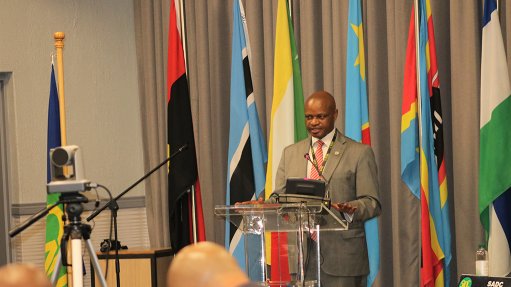
Outgoing chairperson of the SADC Anti-Corruption Committee Advocate Andy Mothibi
Photo by: Supplied
Outgoing chairperson of the Southern African Development Community (SADC) Anti-Corruption Committee (SACC) Advocate Andy Mothibi said on Wednesday that heading the committee has been worthwhile and a success, citing a new anti-corruption action plan that was developed and reviewed for the region during his tenure.
Mothibi was speaking to Polity in Boksburg during a meeting with SADC heads of Anti-Corruption Agencies under the theme ‘Strengthening regional cooperation and capacity to address corruption’.
The two-day meeting, held by the Special Investigating Unit (SIU), aims to strengthen efforts to implement the SADC Strategic Anti-corruption Action Plan for 2023 to 2027, as well as partnerships in the recovery of assets, and enhance coordination between the SADC Secretariat and Member States through the anti-corruption agencies.
Mothibi, who also headed the SIU, said the action plan identified key initiatives and a continuation of a training programme.
He said the SIU had provided training resources to countries such as Zimbabwe and Lesotho.
Mothibi said collaborating with other SADC countries in fighting corruption was important to stop corruption in the region and in respective countries.
He said as criminals use cross border mechanisms, the region should work together to expose them through extradition and asset recovery.
Member States have incorporated various legislation to easily extradite those who have been identified as cross-border criminals.
“The strategy envisages that we should have an effective prevention programme which will mobilise the society approach involving business, civil society, the media and even private sector. We need all of us to work together in identifying and promoting the scourge of corruption,” Mothibi said.
In South Africa, he promised that the SIU would implement the recommendations of the Zondo Commission.
Incoming chairperson of the SACC Dr Noah Paulus from Namibia said Mothibi has laid the key foundations and he added that many of the successes in member countries were adopted from South Africa.
He said South Africa had introduced robust laws such as the law on prevention of organised crime.
“Law is never cast in stone and its challenges are also emerging and the law should meet such challenges and make sure that the loopholes are closed. When we adopted the foundation that South Africa has laid, it made it possible for us to do our best in fighting corruption. All member States have legal frameworks in place but now it’s a question of increasing the momentum by making sure that we raise awareness effectively, implement intervention programmes and make sure that those who are committing corruption are called to account, investigated and brought before the court of laws as we have witnessed high ranking officials in South Africa and Namibia being called to account. That is the way to go if we want to take the region to better heights,” explained Paulus.
He told Polity that he would encourage all member States to have multiple law enforcement agencies such as the SIU, Hawks and Public Protector Office in an effort to fight corruption administratively or through criminal investigation.
He said it should not be left to one institution to fight corruption.
“As a region the most important thing is when we speak with one voice. Our laws must talk to each other. We should not be antagonistic because we cannot successfully fight the national crimes because criminals will thrive comfortably in other countries even though there are member States,” he added.
He hoped to engage more with the other member States to determine which countries needed technical capacity in terms of changing the laws or training.
He concluded that political commitment was vital in fighting corruption as it cascaded in all structures and pressures all institutions to fight corruption.